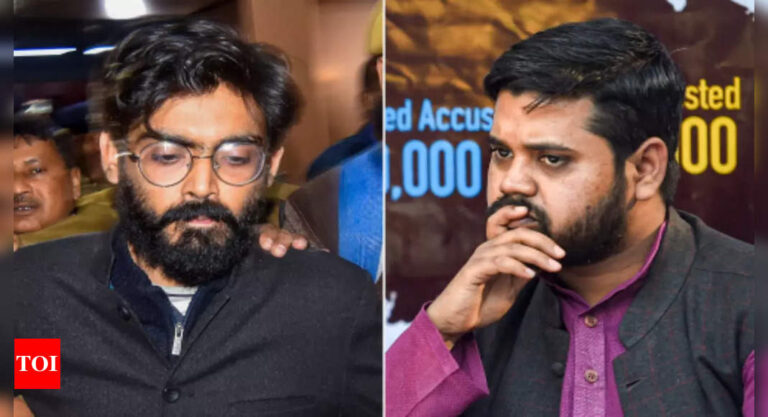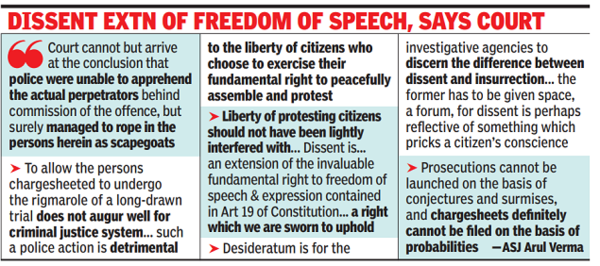
[ad_1]
Coming down heavily on police, the court said there was no evidence that the accused were part of a conspiracy and had acted in tandem or had participated in the mob violence or even used weapons or thrown stones. It said that prosecutions cannot be launched on the basis of “conjectures and surmises” and chargesheets cannot be filed on the “basis of probabilities”.
Additional sessions judge Arul Verma rapped police for filing an “ill-conceived” chargesheet, adding that their case was “devoid of irrefragable evidence”. Discharging 11 of the 12 accused, the judge observed: “Marshalling the facts as brought forth from a perusal of the chargesheet and three supplementary chargesheets, this court cannot but arrive at the conclusion that police were unable to apprehend the actual perpetrators behind commission of the offence, but surely managed to rope in the persons herein as scapegoats.”

Upholding the citizen’s right to protest, the judge observed: “Liberty of protesting citizens should not have been lightly interfered with. It would be pertinent to underscore that dissent is nothing but an extension of the invaluable fundamental right to freedom of speech and expression contained in Article 19 of the Constitution of India, subject to the restrictions contained therein. It is therefore a right which we are sworn to uphold. This court is duty-bound to lean towards an interpretation which protects the rights of the accused, given the ubiquitous power disparity between them and the state machinery.”
“The desideratum is for the investigative agencies to discern the difference between dissent and insurrection. The latter has to be quelled indisputably. However, the former has to be given space, a forum, for dissent is perhaps reflective of something which pricks a citizen’s conscience,” the court observed.
Describing the belated recording of the statements of witnesses, almost after a year of the incident, as “equally strange”, the court noted that even after identifying one Bilal Ibnu Shahul in the crowd, police didn’t make him an accused but a police witness.
“It is apparent that police has arbitrarily chosen to array some people from the crowd as accused and others from the same crowd as police witnesses. This cherry-picking by the police is detrimental to the precept of fairness,” said the judge.

2019 Jamia violence case: Delhi court discharge Sharjeel Imam, Asif Iqbal Tanha
Asserting that the answer to the question whether the accused persons were even prima facie complicit in taking part in the mayhem was “an unequivocal no”, the court stated that prima facie there was no evidence that the accused resisted the execution of any law.
Noting that all the accused persons allude to the fact that although they were present at the spot, they were not part of the unlawful assembly, the court said that no overt act or participation in the commission of offences was attributed to them.
“There are no eyewitnesses who could substantiate the version of police that the accused persons were in anyway involved in the commission of the offences,” said the court.
The FIR was registered against the accused for alleged offences under Sections 143 (unlawful assembly), 147 (rioting) 148 (rioting armed with deadly weapon), 149 (every member of unlawful assembly guilty of offence committed in prosecution of common object), 186 (obstructing public servant in discharge of public functions), 353 (assault or criminal force to deter public servant from discharge of his duty), 332 (voluntarily causing hurt to deter public servant from his duty), 333 (voluntarily causing grievous hurt to deter public servant from his duty), 308 (attempt to commit culpable homicide), 427 (mischief causing damage to the amount of fifty rupees), 435 (mischief by fire or explosive substance with intent to cause damage to amount of one hundred or (in case of agricultural produce) ten rupees, 323 (punishment for voluntarily causing hurt), 341 (punishment for wrongful restraint), 120B (criminal conspiracy) and 34 (acts done by several persons in furtherance of common intention) of IPC.
“Needless to say, the investigative agency is not precluded from conducting further investigation in a fair manner, with the leave of the court, in order to bring to book the actual perpetrators, with the adjuration not to blur the lines between dissenters and rioters and to desist from henceforth arraigning innocent protesters,” said the court.
Observing that the prosecution had been launched in a “perfunctory and cavalier fashion” against the accused persons, except Mohammad Ilyas, aka Allen, the court asserted that the investigative agencies should have incorporated the use of technology, or gathered credible intelligence, and then only should have “embarked on galvanising the judicial system”.
Interestingly, the main chargesheet had been filed against Mohammad Ilyas on April 21, 2020, following which a supplementary chargesheet was also filed against him. Later, a second supplementary chargesheet was filed against the 11 other accused, namely Mohammad Qasim, Mahmood Anwar, Shahzar Raza Khan, Mohd Abuzar, Mohd Shoaib, Umair Ahmad, Bilal Nadeem, Sharjeel Imam, Asif Iqbal Tanha, Chanda Yadav and Safoora Zargar.
[ad_2]
Source link